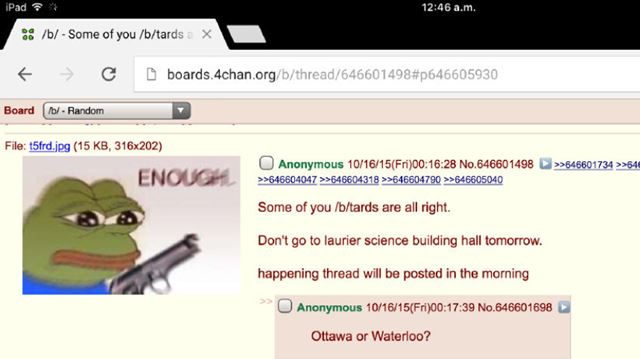As many of us are aware, the first threat had been traced and a man in the UK has been arrested. There was no nonchalant behaviour surrounding this threat, and authorities acted upon it quickly. It started making me think about how heavily influenced we are by the public social sphere. What can be interpreted as a cowardly and immature blog post, resulted in a legitimate security lockdown of a large academic institution, not to mention, in a completely different continent of the world. Drawing on this weeks readings - I thought this made a great connection to the documentary "We Will in Public". It was illustrated that the dot.com era would ultimately come to control our lives, and they were indeed correct. The documentary specifically focuses on the successes and failures of the dot.com era, yet it stimulated thought about how Internet has come so far, from its nascent stage. Virtual space and interaction has the ability to translate and reflect upon actionable human behaviour - and increasingly impacts social engagement and action.
Wilfrid Laurier Threat - via Snapchat (Global News)
1st Wilfrid Laurier Threat - UK source (northumberlandnews.com)
Further, these threats also embody a facet of the imaginary of informational capitalism. What the Internet is capable of is completely unknown to us humans, and it continues to surprise us. Therefore, peculiar behaviour such as social media threats against a University, perpetuates a thought of fear and anxiety. And we as humans, react appropriately. The man in the UK is playing a role of the imaginary. In his news interview he states that he utilizes the website as a place to "vent" or "get away", which suggests that it is somewhat of a utopian landscape of expression. Here we witness how the imaginaries of the Internet, and its capabilities play an influential on informational capitalism. It is this kind of imaginary information that is relayed to us as citizens, quite seemingly how a fictional blog post, becomes information that is able to capitalize on us as naive individuals.


I think it’s interesting how anonymity played a huge part in both these threats. The Internet provides people with the ability to remain anonymous online allowing people to post whatever they want thinking they will not have to face any consequences. It is interesting how the online world impact decisions made in the real world, such as lockdowns, and how police are increasingly finding out the identities of those hiding behind anonymity online. Another example is how University of Missouri recently experienced racial threats against black students through an anonymous app called Yik Yak.
ReplyDeletehttp://www.nbcnews.com/tech/tech-news/yik-yak-messaging-app-anonymous-until-police-come-knocking-n462031
Another interesting example of how anonymity can be used for social good and for bad is reflected in the link below which describes ways a terrorist group called ISIS has used social media and anonymity to threaten the United States, and how Anonymous group has hacked their social media accounts and planned to target countries that have been accused of funding ISIS. The video that Anonymous created found in the link below is very interesting and worth a watch.
http://bluenationreview.com/hacker-group-anonymous-isis-will-hunt/#ixzz3rIOBEShF
Hackers and bullies love to post on anonymous networks but often these networks are monitored but they are unaware. Sites that truly change the IP and create pure anonymity are troublesome because without monitoring could lead to threats and violence as we see on Reddit. Although, these are isolated incidents, I think there can always be a chance of unstable people to act irrationally. I would like to see disruption to monitoring online in terms of selling data and invasion of privacy. However, I would not be willing to compromise safety for that privacy.
ReplyDelete